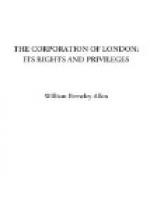* The authority chiefly consulted for the following statements is Pulling’s “Practical Treatise on the Laws, Customs, Usages, and Regulations of the City and Port of London.”
Strictly speaking, London cannot be said to possess any original charter, or specific definition of its rights and franchises. Those conferred since the Conquest, without exception, allude directly or indirectly to preceding documents of a similar nature. In fact the customs and usages of the City grew out of the ancient Saxon institutions, grafted, as they were, on the Roman municipal stock. The City of London represents a county, and as such is divided into hundreds, called wards; each having its own wardmote, presided over by its own alderman. The Lord Mayor, the Court of Aldermen, and the Court of Common Council, together with the incorporated guilds which elect the civic magistrates, form the municipal constitution.
In ancient times the chief civic magistrate was styled the Reve, or Portreve, but in 1207 John changed this title to that of Mayor. The appellation of Lord was first prefixed in the fourth charter of Edward III., when the honour of having gold or silver maces borne before him was conferred on the “Lord Mayor,” who ranked moreover as an earl. His duties are multiplex and ubiquitous. In his own person he represents all the rights and privileges of the Corporation. He is said to hold the same relation to the City as the Crown does to the rest of the kingdom. He is chief butler at the coronation of the sovereign, lord-lieutenant of the county of London, clerk of the markets, gauger of wine and oil, meter of coals and grain, salt and fruit, conservator of the Thames, admiral of the port, justice of gaol delivery for Newgate, chairman of every committee he attends, and subject to many other burdens. The election of Lord Mayor takes place on the 29th September, when the livery usually nominate the two senior aldermen who have not passed the chair; of these the senior is generally chosen by the Court of Aldermen. The chain of office is then placed round his neck, and he himself presented to the Lord Chancellor. He does not, however, immediately enter upon his important duties, but remains in a chrysalis form, under the title of Lord Mayor elect, until the 8th of November, when he takes the oath of office, at the Guildhall, and on the following day is presented to the Barons of the Exchequer, at Westminster, for the confirmation of the Crown. The annual salary is 8,000 pounds, which rarely suffices to meet the incessant demands on the Lord Mayor’s charity and hospitality. He is expected to contribute to every charitable institution within his jurisdiction, and to a great many beyond it, and to head every subscription for praiseworthy purposes. His private alms also amount to a very large sum, and his hospitality is proverbial. He represents, in short, the best phase of the old feudal baron, or rather of the Saxon eorl, exercising a paternal and beneficient supervision over all who reside within the limits of his authority.




